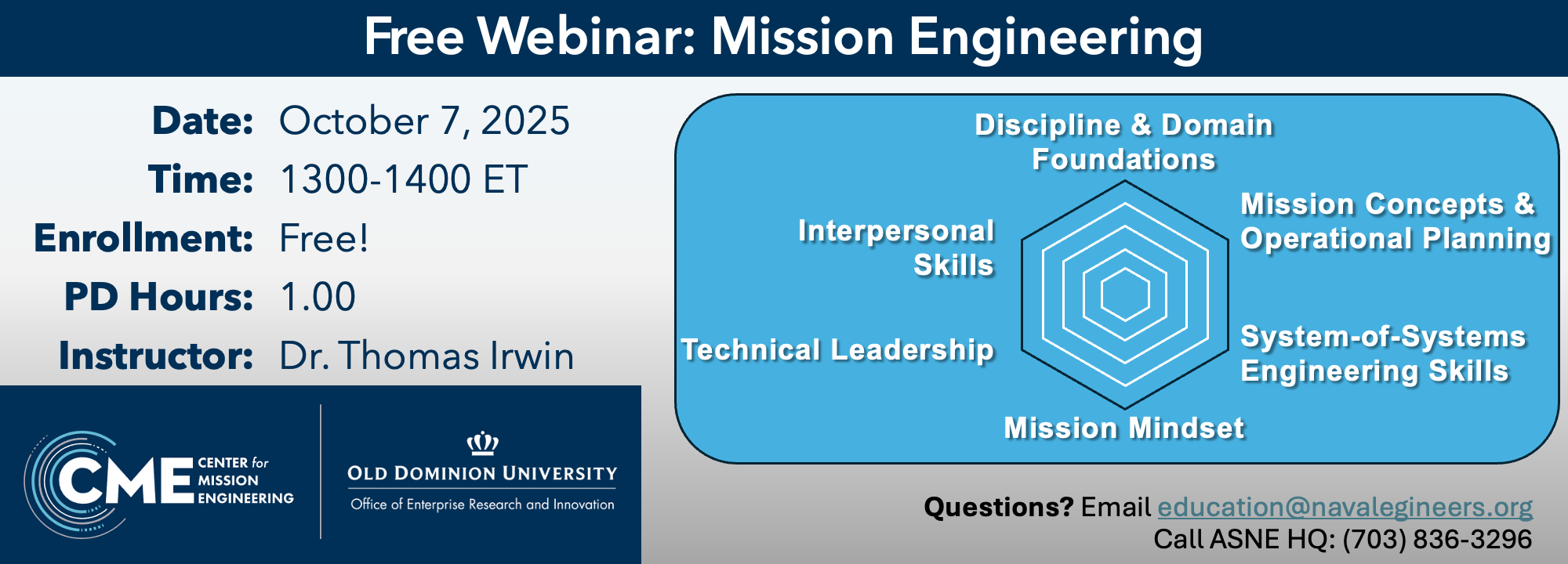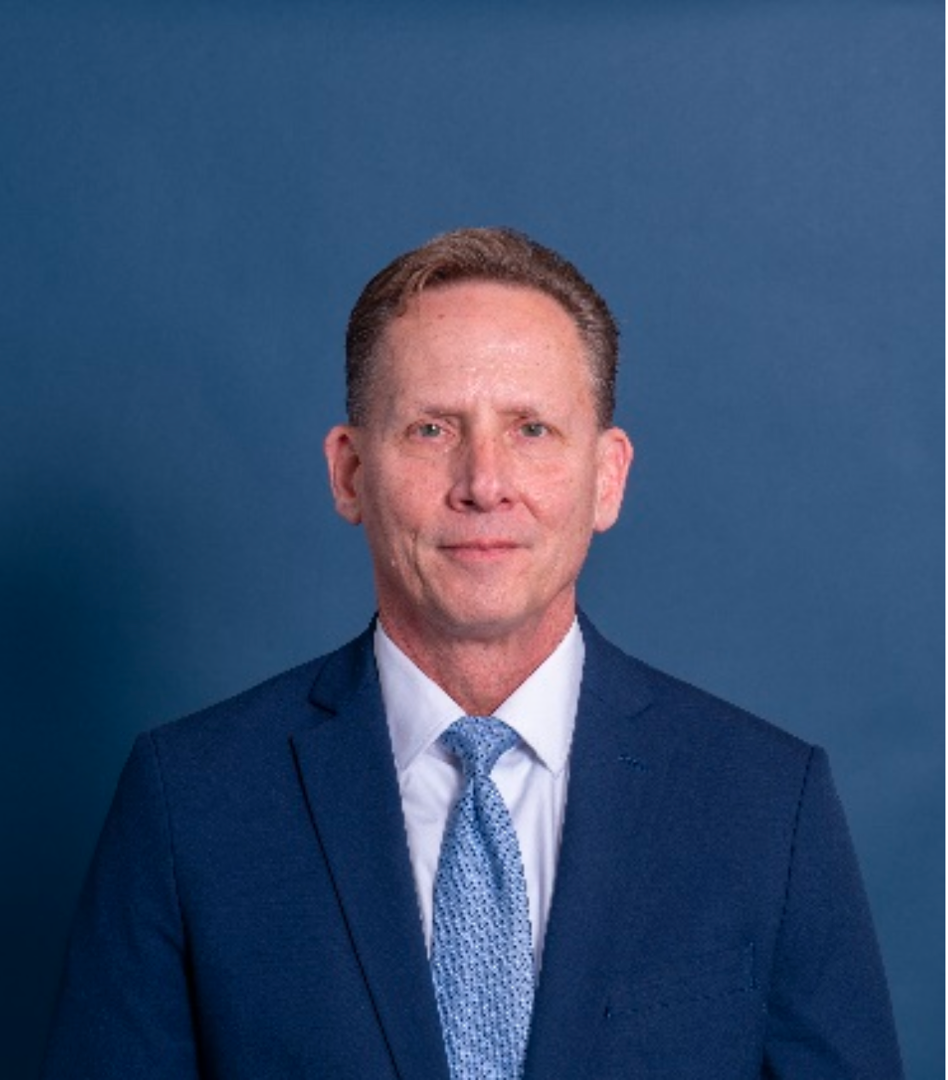Mission Engineering
Overview:
Old Dominion University’s (ODU) Center for Mission Engineering (CME) conducted a
foundational two-day Mission Engineering (ME) Competencies Workshop in March 2025 that involved the U.S.
Navy, Marine Corps, Air Force, NASA, and the University of New South Wales. The workshop was hosted by Kitty
Hawk Technologies in Dahlgren Va. and facilitated by Dr. James Moreland, a former Dept. of Defense SES and
ODU faculty. The event focused on updating the roles, competencies, and skills essential to ME as documented
in the April 30, 2018, Systems Engineering Research Center (SERC) Mission Engineering Technical Report. The
updated ME competency framework presents a guide for workforce development, training, and cross-agency
collaboration in support of complex, mission-driven systems. The CME is planning subsequent workshops in
conjunction with the Naval Surface Warfare Centers. With ME playing an increasingly prominent role in
defense and related industries, – are both foundational and timely.

Date & Time: October 7, 2025 1300-1400 ET
Audience: All program managers,
engineers, executives, grant writers, and students interested in engineering maritime
systems.
Virtual Course Format: This presentation and discussion will occur in Microsoft Teams.
If you do not have Teams, you will be able to view this event in your browser.
Enrollment Fee:
FREE!
Professional Development Hours: 1.00 Hour (free for ASNE Members or $40 for
nonmembers). Please use the ASNE
PDH form and send it to education@navalengineers.org.)
Questions:
Please email education@navalengineers.org or call ASNE HQ
at (703) 836-6727.
Speaker Biography
Dr. Thomas Irwin
Executive Director, Center for Mission Engineering
Office of Enterprise Research
and Innovation
Old Dominion University
 The Center for Mission Engineering (CME) is an interdisciplinary applied research center
focused on advancement in designing, analyzing, integrating, and improving the ability of engineered
systems to deliver desired mission effects at the strategic, operational, and tactical levels. Our
offices are in Washington D.C. and Suffolk, Virginia. Leads the Old Dominion University, regional, and
statewide effort to build an ecosystem of researchers, innovators, problem solvers, and entrepreneurs
working in or with Mission Engineering to identify opportunities, accelerate development, and realize
visions. The CME team will work directly with those entrepreneurs, innovators, and researchers to help
them develop viable business models and to connect them with the financial, intellectual, and social
capital necessary to assemble the personnel, expertise, and experience necessary to make Virginia a
national leader in Mission Engineering. The CME is developing transformative tools (models and
simulations) to rigorously define and facilitate the practice of mission engineering. The models are the
first of their kind and will advance the state of the art in mission engineering. The initial
application of this strategy is a system dynamics model that can be used to simulate strategies for
Defense Manufacturing Readiness and help decision-makers ensure the availability of products and
services to support the warfighter in accomplishing defense missions.
The Center for Mission Engineering (CME) is an interdisciplinary applied research center
focused on advancement in designing, analyzing, integrating, and improving the ability of engineered
systems to deliver desired mission effects at the strategic, operational, and tactical levels. Our
offices are in Washington D.C. and Suffolk, Virginia. Leads the Old Dominion University, regional, and
statewide effort to build an ecosystem of researchers, innovators, problem solvers, and entrepreneurs
working in or with Mission Engineering to identify opportunities, accelerate development, and realize
visions. The CME team will work directly with those entrepreneurs, innovators, and researchers to help
them develop viable business models and to connect them with the financial, intellectual, and social
capital necessary to assemble the personnel, expertise, and experience necessary to make Virginia a
national leader in Mission Engineering. The CME is developing transformative tools (models and
simulations) to rigorously define and facilitate the practice of mission engineering. The models are the
first of their kind and will advance the state of the art in mission engineering. The initial
application of this strategy is a system dynamics model that can be used to simulate strategies for
Defense Manufacturing Readiness and help decision-makers ensure the availability of products and
services to support the warfighter in accomplishing defense missions.
Career Chronology:
- SES Deputy Director, Joint Force Integration: Joint Staff J7 Apr23-Jan24
- SES Executive Director, Joint Warfighting Development; Joint Staff J7 Nov20-Apr23
- SES Executive Director, Joint Force Development and Design Integration; Joint Staff J7 Sep18-Nov20
- SES Executive Director, Future Joint Force Development; Joint Staff J7 Sep18-Nov19
- SES Executive Director, Joint Training; Joint Staff J7 Sep14-Sep18
- SES Deputy Director, Joint Environment; Joint Staff J7 Aug11-Sep14
- SES Enterprise Director; U.S. Joint Forces Command J9; Joint Concept Development and Experimentation
Oct09-Aug11
- Product Group Director, Marine Air-Ground Task Force Command and Control; Marine Corps Systems
Command, Quantico, VA Jun04-Oct09
- Extensive career in the NAVSEA Warfare Centers, holding various technical and management positions
for Theater Warfare Systems, Battle Force Interoperability, Aegis Combat Systems, Gunfire Control
Systems, and Self Defense Missile Systems.
Education:
- Ph.D., Systems Engineering; Naval Postgraduate School, Monterey, CA; 2018
- Master of Science, Systems Engineering Management; Naval Postgraduate School, 2009
- Bachelor of Science, Mechanical Engineering; North Carolina State University, Raleigh, NC; 1983
Overview of In-Person Workshop Opportunity
Workshop Demand Signals
- Clarify ME’s definition, baselining core competencies, architectures, roles, and knowledge areas.
- Document proceedings to support improved future ME precepts and practices.
- Provide an ME framework for planning, professional development and recruitment.
- Promote ME alignment among government, academic, and industry stakeholders.
By articulating ME competencies and mapping them to relevant skills and roles this Report – and its
robust complement of Appendices for professional readers -- contributes to a shared understanding of
ME’s role in delivering optimal mission-driven, risk-informed and interoperable capabilities for
operational users. 1.1. Workshop Context, Goals and Objectives, and Structure Context ME is increasingly
recognized as a critical discipline that upscales Systems Engineering (SE) practices, delivering ability
to meet mission objectives with system-level capabilities , through mission-focused analysis and
decision support . As missions grow more complex and multi-domain in nature, there is increased need to
define the unique interdisciplinary ME competencies that distinguish it from traditional SE, whose
precepts are necessary but not sufficient to handle today’s complex environment. The SERC-2018-TR-109
report on ME laid the foundation for understanding enterprise transformation through Digital Engineering
(DE), System-of-Systems (SoS) modeling, and competency development.
Workshop Goals and Objectives
The ME Competency Workshop goal was to address the need for a clear, shared understanding of the roles,
skills, and competencies essential to the practice of ME across the DoD, NASA, Academia, other
industrial sectors, and allied partners. With increasing emphasis on delivering integrated,
mission-focused and interdisciplinary capabilities, this workshop was planned to support workforce
development efforts aligned with both the OSD(R&E) Mission Engineering Guide v2.0 and broader
transformation initiatives in SE and acquisition: • Develop a draft interdisciplinary ME Competency
Framework (see Figure I), structured to support workforce development, education, and training at
novice/practitioner/expert levels of proficiency. • Define and clarify the roles involved in ME practice
as they differ from or complement those in traditional SE, operational analysis, and acquisition.

PD
Event Survey (log-in required)
Questions, comments, suggestions? Email us at education@navalengineers.org